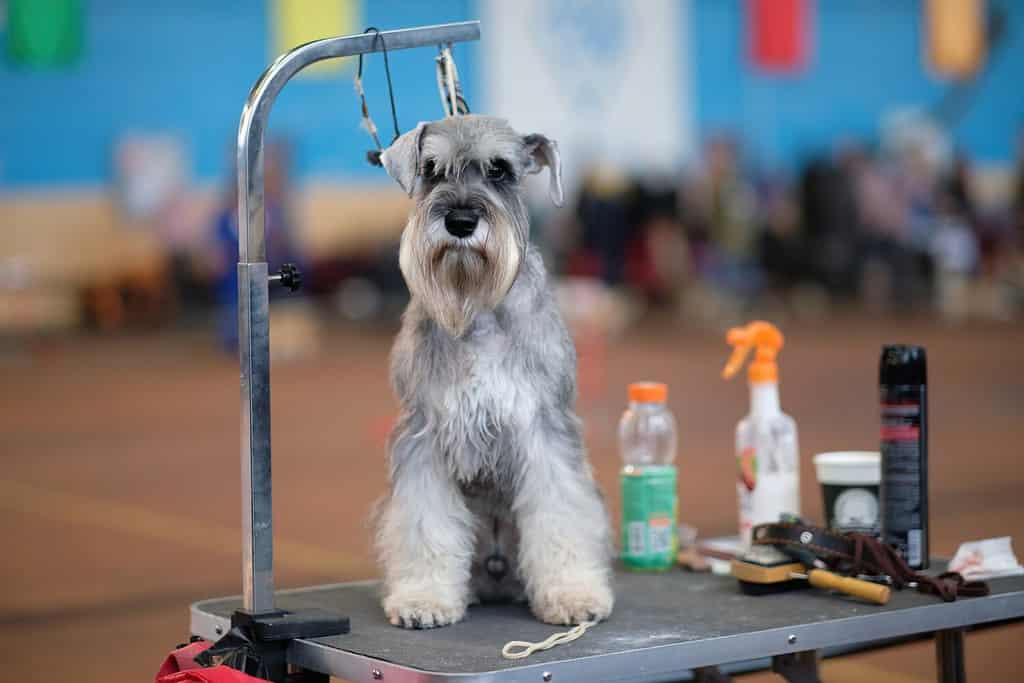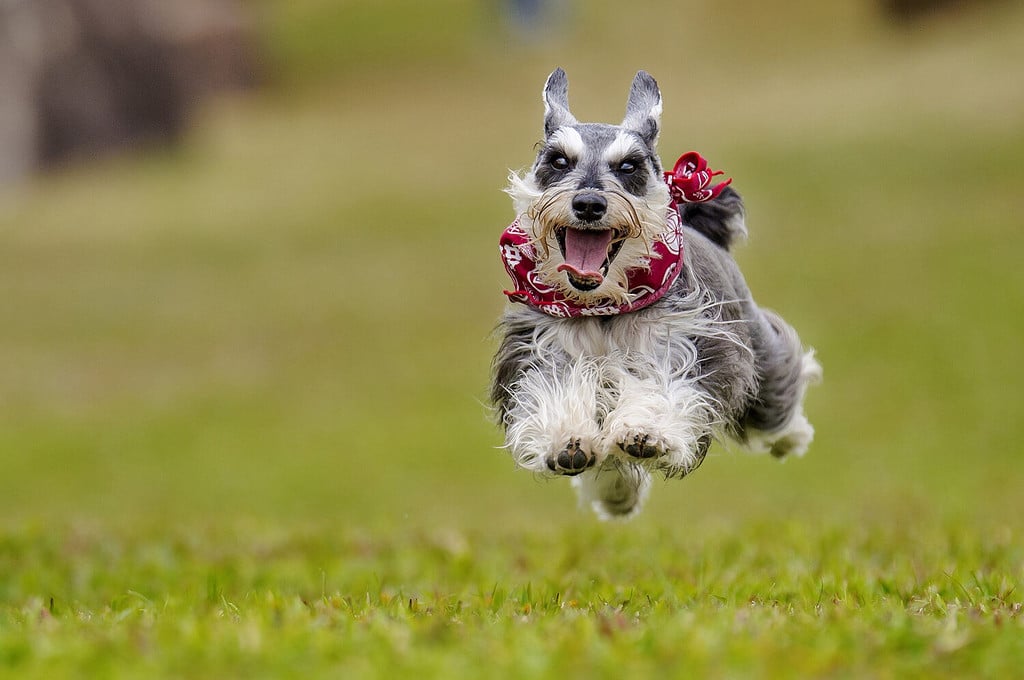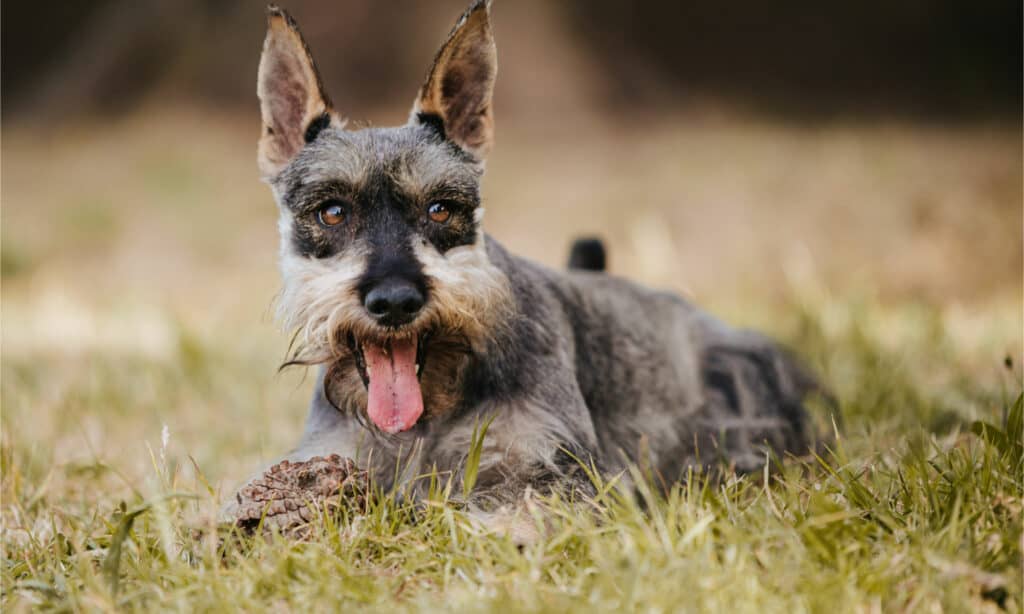With their signature mustaches, iconic whiskers, and fuzzy eyebrows, it’s easy to fall in love with schnauzers. These charming dogs are loyal and loving, sharing their joy and enthusiasm for life through everything they do. Originating in Germany, schnauzers come in three sizes — standard, giant, and miniature. However, before bringing one of these cute canines home, it’s important to consider their unique needs and potential challenges. Check out these common “complaints” about schnauzers so you can be fully prepared to give your new pup a happy and healthy life!
1. Barking

Schnauzers are extremely intelligent and can learn many new behaviors.
©dien/Shutterstock.com
Schnauzers were originally bred to be alert working dogs. They helped to catch rodents on farms, drive livestock, and guard animals, people, and property. The inherent traits that made them such excellent guardians, however, can be challenging when kept as house pets — especially barking.
Schnauzers are very vocal dogs and tend to bark at anything they may think is suspicious — whether that is a bugler, the mailman, or just a squirrel running across the lawn. In addition, schnauzers also bark and utilize other vocalizations to express their needs. They may bark when on alert, as well as when they are frustrated, lonely, bored, or excited. It is very important to begin training and socialization with schnauzers when they are young to help with any excessive barking, which is one of the common complaints with this breed.
2. Grooming

You should bathe your schnauzer at least once a month.
©Ihar Halavach/Shutterstock.com
Schnauzers are well-known for their long beards and large, fluffy eyebrows. Due to this adorable facial hair, owners need to regularly check, clean, and brush out their beards, which tend to pick up dirt, food, and other debris.
Schnauzers also have a thick double coat with a layer of wiry, water-resistant hair on top. They do not shed a lot, but that also means they need to be brushed regularly to help remove loose hair and prevent matting. Schnauzers also need their hair trimmed and groomed often, especially if you wish to retain their iconic look.
3. Stubbornness

Some owners may become frustrated when training a stubborn schnauzer.
©Natalia Bostan/Shutterstock.com
Schnauzers are incredibly intelligent dogs and amazing problem solvers. They learn commands quickly, but they can also be quite stubborn. Bred to watch over livestock and work independently, schnauzers have a strong will and a mind of their own. This is another reason why it is so important to begin training and socializing these dogs when they are young. Training a schnauzer can be very rewarding, as these dogs can learn nearly any behavior! However, it also requires patience, consistency, and lots of positive reinforcement.
4. High Energy

Schnauzers are lively and need plenty of opportunities to burn off excess energy.
©L-N/Shutterstock.com
Schnauzers are very spirited and enthusiastic dogs who need regular exercise every day. As working dogs, schnauzers need both physical exercise as well as mental stimulation. They get bored very easily, which can lead to destructive behaviors like digging, chewing, and barking. Fortunately, schnauzers are social dogs who love to play and be with their human companions. They make excellent walking and hiking buddies and do well with dog sports and other games.
5. Separation Anxiety

Schnauzers form strong bonds with their families.
©iStock.com/EllenaZ
Schnauzers love being with their families! However, this can also lead to separation anxiety if they are left alone for too long. These dogs should not be shut up alone in a room or kennel or left in the backyard alone for long periods. Separation anxiety in schnauzers often leads to destructive behaviors like digging, chewing, and excessive barking. Schnauzers do best when someone is home most of the day or if they accompany you on your adventures.
6. High Prey Drive

One of the common complaints about schnauzers is that it can be difficult to redirect their attention.
©Debra Anderson/Shutterstock.com
Bred as working dogs and as rodent catchers, schnauzers have a high prey drive and will chase any small animal that they see. You should always keep your schnauzer on a leash (preferably with a sturdy harness) or in a fenced area because this prey drive is simply too strong for them to ignore. They can become extremely focused and may even try to chase while on a leash. Consistent training, socialization, and positive reinforcement are a must with this dog breed.
7. Health Concerns

Most schnauzers are very healthy dogs.
©Oakland Images/Shutterstock.com
Overall, schnauzers are very healthy dogs and typically live 12 to 16 years. However, they are susceptible to a few health concerns. Schnauzers can be affected by hip dysplasia, eye disorders, high cholesterol, pancreatitis, hypothyroidism, skin allergies, and bladder stones.
If you get a schnauzer from a breeder, be sure that they have been tested for these various conditions. In addition, regular visits to your veterinarian will help your dog to live a happy and healthy life.
The photo featured at the top of this post is © Debra Anderson/Shutterstock.com
Ready to discover the top 10 cutest dog breeds in the entire world?
How about the fastest dogs, the largest dogs and those that are -- quite frankly -- just the kindest dogs on the planet? Each day, AZ Animals sends out lists just like this to our thousands of email subscribers. And the best part? It's FREE. Join today by entering your email below.
Thank you for reading! Have some feedback for us? Contact the AZ Animals editorial team.






